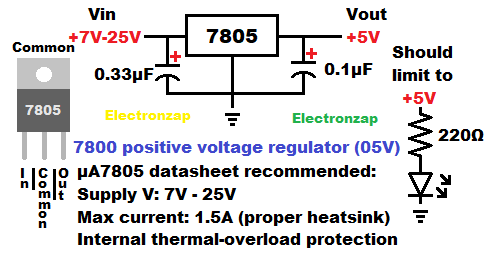Table of Contents
When the supply voltage is too high for some circuitry, then a linear voltage regulator is one option for providing a lower voltage to that circuitry.

After the 78 and 79, the 00 is replaced with the number of volts that the IC will output when powered by at least 2 volts higher than that.
- 7805 will output +5V higher than it’s common pin, usually connected to 0V ground.
- 7809 will output +9 higher than it’s common pin, usually connected to 0V ground.
- 7812 will output +12V higher than it’s common pin, usually connected to 0V ground.
The 7800 and 7900 series linear voltage regulator integrated circuits commonly come in the 3 terminal TO-220 package that many transistors come in. There is also the 78L00 positive and 79L00 negative series linear voltage regulators that come in the TO-92 package, that the most common through hole transistors come in.
The voltage that is dropped from the load, meaning the voltage going in to the linear voltage regulator, minus the voltage coming out of the linear voltage regulator, is simply converted into waste heat. If you want to lower (or even raise) the DC voltage without much power loss, then you want to use either a buck converter or a boost converter instead of using a linear voltage regulator.
Good topics to check out next:
To support this site, check out the following links:
- Check out my YouTube videos! https://www.youtube.com/c/Electronzap/videos
- Products I used in my videos or otherwise think look like a good buy. As an Amazon associate, I earn from qualifying purchases. https://www.amazon.com/shop/electronzapdotcom
- Information on this site is not guaranteed to be accurate. Always consult the manufacturer info/datasheet of parts you use. Research the proper safety precautions for everything you do.
- Electronzap is a participant in the Amazon Services LLC Associates Program, an affiliate advertising program designed to provide a means for sites to earn advertising fees by advertising and linking to amazon.com.